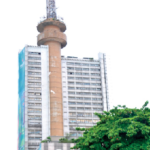The Nigerian Information and Communications Technology (ICT) sector’s trajectory since 1960 has been that of sweet then sour and then sweet, at least for now.
From the time of Post and Telecommunications Company of Nigeria (P&T) to the time of Nigerian Telecommunications Limited (NITEL) and to the time of Global System for Mobile Communications (GSM), Nigeria’s ICT sector has gone through a long and tortuous journey that left better tastes in the mouth of many aged Nigerians.
Few of them who had telephone boxes in their homes in the 1960s, 1970s and 1980s suffered to enjoy it. But many of them who did not have the ‘magical boxes’ in their homes and who would line up for days at NITEL offices to reach their love ones abroad even suffered more.
NITEL’s monopolistic grab of the entire ICT and telecom market strangulated many Nigerian businesses until 2000 when the sector escaped its grip.
In August 2000, when the new mobile communications technology was launched in the country, some more people became proud owners of the new technology.
Since then, it has been a sweet story for many Nigerians and their businesses, except for high cost of tariffs which many Nigerians have now come to accept as a norm.
The sweet story
Currently, the ICT sector in Nigeria account for 17.83 percent of national GDP, one of the highest in the second quarter. The sector attracted 35 percent of the cumulative Foreign Direct Investment (FDI) between 2001 and 2017, according to National Bureau of Statistics (NBS).
As of August 2020, Nigeria had more than 193 million active mobile telecommunications subscriptions, a considerable increase from 186million it was last year.
Although infrastructure gaps persist, Nigerian investment in infrastructure projects has been extensive and is ranked second after South Africa, with 106 projects valued at $100 billion. This was enabled by several initiatives by the Nigerian Government to improve the business climate in the country and make trade simpler.
Telcos speak
Speaking on Nigeria’s 60 years of ICT and telecommunications, the President of Association of Telecommunications Companies of Nigeria (ATCON), Engr Olusola Teniola said Nigeria has had 20 years of solid growth which means tens of direct and indirect jobs have been created by the sector.
He said: “We have had almost 20 years of solid growth which means effectively direct and indirect employment, increased GDP contribution, increased mobile telephony penetration and biggest telecoms market in SSA. There are areas that have dogged us in terms of infrastructure challenges and the dearth of power from the grid and skill sets challenge. However, alongside these and recurring issues regarding doing business the positives outweigh the negatives and we have now created an underlying platform that is being prepared for the critical role it plays in the Digital Economy’’
According to him, the Financial Sector and e-Commerce have had their development thrived on the back of telecom and ICT sector.
He said the basis of connectivity and meaningful connectivity that ensures that electronic transactions are carried out and that a certain degree of automation is introduced like never before. This improvement in productivity will only increase the GDP to exceed our population growth and raise many Nigerians out of the poverty trap, he added.
However, he said, the industry needs a repeat of the sort of investments that were made in the first ten years of the development of the current industry.
“During that period it is estimated that circa $58bn was attracted into both sectors and this now equates to USD$70bn or thereabouts, so a slowing down of FDI has occurred over the latter periods and this we need Government to change by providing the environment that attracts further investments to the same tune (circa USD$120bn by 2030) so that broadband is pervasive and that investment grows our economy by 1.38% year-on-year on the assumption that we achieve at least 70% broadband penetration by 2025’’, he said.
Areas to improve on
‘’At present, there are few incentives, besides the large population, for a new entrant to invest into the Nigerian market, or for current players to expand existing operations through fresh investments. Foreign investment in the sector since 2014 has been minimal as a result. Domestic investment has not been able to compensate for this, especially with over $5 billion having been sucked out of the sector by what are regarded as punitive penalties that were disproportionate to the infringements for failure to register SIM cards’’, said Allison Gillwald and others in their research work, The State of ICT in Nigeria.
This, together with high dollar/naira exchange rates set by government, which have limited the importation of dollar-based equipment required for network extension, has brought the sector to a low point, Daily Trust reports.

 Join Daily Trust WhatsApp Community For Quick Access To News and Happenings Around You.
Join Daily Trust WhatsApp Community For Quick Access To News and Happenings Around You.